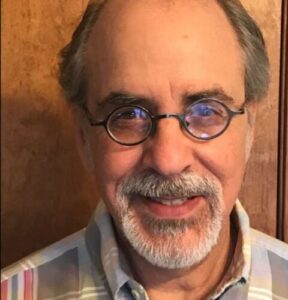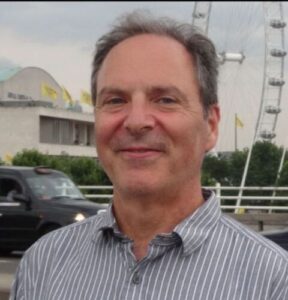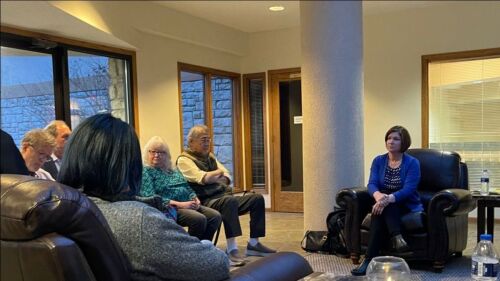The Shapiro Brothers
by Laura Taxel
Jeremy and Eric Shapiro are brothers. Both live and work in and around Shaker Heights, Ohio, not far from where they were born and raised. One is a doctor that treats the body, and the other works to heal the mind. They share the belief that the terminally ill should have access to medical aid in dying, making them part of a nationwide movement to rethink end-of-life care and what it should include.
Allowing mentally capable individuals with six months or less to live to request a doctor’s prescription that will hasten their inevitable death is legal in nine states and the District of Columbia. Ohio End of Life Options is a nonprofit dedicated to helping Ohioans have that same opportunity for decision-making. Jeremy Shapiro became a contributor after hearing an ad for the group on the local public radio station. He joined the board in 2020 and has since encouraged Eric to get involved. They represent a small but growing number of healthcare professionals willing to speak out in support of adding medical aid in dying (MAID) to the palliative medicine and hospice services already available.

Dr. Jeremy Shapiro
“The question of what makes life worth living is profound and very personal,” says Jeremy Shapiro, a clinical psychologist in private practice, author, and Adjunct Assistant Professor of Psychology at Case Western Reserve University. “There can be no right or wrong answer. So, the freedom one has to choose for oneself when doctors have confirmed that death is imminent should be respected. Why would you prolong physical or emotional suffering and deny someone the chance for an easier, more peaceful ending if that is what they wish for themselves?”
Jeremy Shapiro, Ph.D., who regularly posts to his blog on the Psychology Today website, has researched the psychology of applied effective messaging in psychotherapy, self-change efforts, and politics. He has discovered that framing opinions on a spectrum of beliefs and ideas offers an alternative to polarized, black-and-white thinking. This research establishes a middle ground on which differing truths and viewpoints can co-exist. Jeremy looks forward to investigating if applying these concepts in discussions about MAID could raise support for passing legislation.
 Dr. Eric Shapiro
Dr. Eric Shapiro
Eric Shapiro, M.D. is a board-certified internist and gastroenterologist affiliated with University Hospitals and an Assistant Clinical Professor of Medicine at Case Western University School of Medicine who has been practicing for more than 30 years. “Confronting death is inescapable,” he says. “It comes up in my work, as it does for every doctor. The problem is that the subject of death is taboo in our culture, making it an inherently tricky topic for many, even those in healthcare.” Everyone wants a communicative and engaging doctor that conveys information in a straightforward and easy-to-grasp way. Doctors should strive to present an approachable, engaging demeanor that makes patients comfortable with asking questions. “I see it as part of my job to help patients and their families face the reality of their situation when death is near and understand their options when no more effective interventions exist. Just as I am responsible for helping each patient live the best life their condition permits.” Dr. Eric Shapiro says. “And with rare exceptions,” he adds, “people are grateful that he speaks honestly and openly with them about dying.”
“Palliative care and hospice are critical and the right approach for many,” Dr. Eric Shapiro explains, “but there will always be those who consider the conditions of their future to be much worse than death itself.” Physicians know but are reluctant to discuss that terminally ill people who reach this stage sometimes stockpile drugs to self-administer a fatal dose when they decide they can’t go on. Others take control by refusing food and water, which can lead to a long, drawn-out decline. “For those who want it, medical aid in dying is a much better way to give them back a sense of control over their own lives and liberate them from feelings of helplessness and despair. I am absolutely convinced that MAID should be one of the options we can offer for end-of-life care.”

Community Engagement
Raising Awareness Amongst Physicians
In March 2022, Dr. Eric Shapiro and the Ohio End of Life Options founder and director, Lisa Vigil Schattinger, accepted the opportunity to speak with the Lorain County Medical Society board members about current mission strides. They emphasized the importance of supporting MAID legislation and shared how someone could get involved with advocacy. Retired neurosurgeon Mario Sertich invited them to speak because he believes “We must be discussing these important issues as physicians.” Representatives of the organization are readily available to discuss the mission to pass a law that makes medical aid in dying a legal choice for qualifying Ohioans. Contact the office to request a speaker for your group or event.
